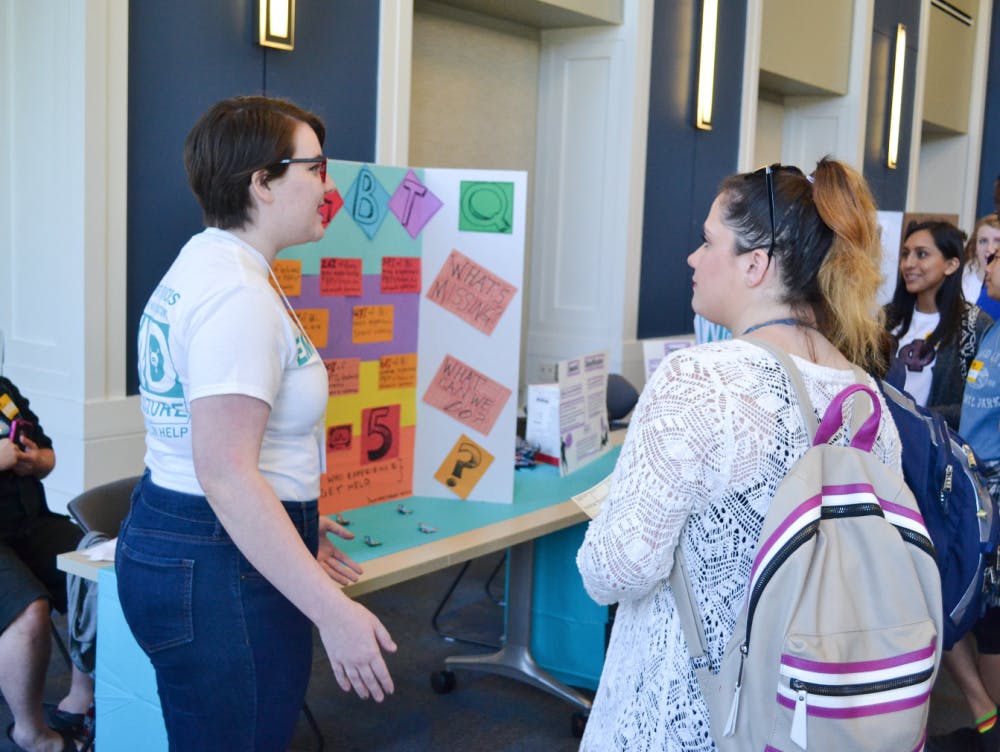By Jennifer Goetz
Staff Writer
About one in five women and about one in 13 men are victims of sexual assault on a college campus, according to national statistics cited in “The Hunting Ground,” a documentary about sexual assault on college campuses.
While the College’s Anti-Violence Initiative has been tackling this issue year round, April marked its Sexual Assault Awareness Month.
AVI peer educators, interns and volunteers informed the campus community about the different aspects of rape culture on Tuesday, April 11, at AVI’s second annual Day to End Rape Culture.

The expo-style event allowed students to walk around the Education Building as they learned about a range of topics, including slut shaming, rape jokes and sexual objectification.
“I love that (students were) able to learn about different aspects of rape culture,” said Jovia Ferris, a junior communication studies major.
Aside from providing helpful information, organizations including Residential Housing and Education, Campus Police and Counseling and Psychological Services, also provided students with helpful resources for sexual assault survivors, and friends and family of survivors.
At one table, sophomore math major Rebecca Conn gave a presentation about the objectification of women.
“People don’t understand the power they have as consumers or individuals (and) they don’t think that they can stop these huge problems, but they can,” she said.
Conn showed students advertisements that clearly portray women as objects, one ad even depicted a woman as a table.
“It’s a very prominent problem, but it’s easily solvable,” Conn said.
Consumers must use social media to draw negative attention to the objectifying ads, until the company takes them down, according to Conn.

With more than 500 students in attendance, the event had an impressive turnout.
“(The event) wasn’t mandatory by any means,” said Rachel Murphy, a Student Anti-Violence peer educator and a junior political science major. “Last year, we had 400 mandatory people come, but we surpassed our goal without having anyone mandated to come.”
While Day to End Rape Culture is AVI’s biggest event during Sexual Assault Awareness Month, the organization also planned several events including the Teal Party, Love Letters to Survivors and Denim Day.
AVI has worked year round alongside Title IX to bring sexual assault awareness to the College, including a recent viewing of “The Hunting Ground.”
Jordan Draper, Title IX coordinator, wants students to be aware of the resources that are available.
“Some people consider it to be a private matter and something they want to deal with on their own, and that makes complete sense because anything sexual is very personal,” Draper said. “It’s just to make sure that when these people are ready to talk about it, that (they know) there are always resources and options for them.”
Draper wants students to understand the definition of sexual assault.
“Most people assume that sexual assault is just penetration. At TCNJ, (sexual assault) is considered to be non-consensual sexual contact,” she said.
If students are unaware that what happened to them can be considered sexual assault, they will not report the incident and “most students don’t report (their assaults) because they don’t think an issue is serious enough,” according to Draper.
Draper and AVI want to spread awareness to the campus community, so students feel comfortable seeking resources, regardless of how minor a sexual assault incident may seem.
“I want every student at TCNJ to know what AVI is, what Title IX is, what sexual assault is and then once we get that, we can dig a little deeper and be able to say, ‘We know that there’s a problem, how do we address it. What can we do?’” Draper said.







